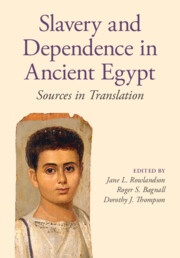Book contents
- Frontmatter
- Contents
- List of illustrations
- List of maps
- List of contributors
- Biographical notice on Jane Rowlandson
- Preface
- List of abbreviations
- Note to the reader
- Aids for the reader
- Glossary of technical terms
- 1 Introduction
- 2 Pharaonic Egypt
- 3 The Late Period
- 4 Jewish perspectives on slavery in Egypt
- 5 Ptolemaic Egypt
- 6 Roman Egypt
- 7 Byzantine and Umayyad Egypt
- Concordance of texts
- Bibliography
- Index
5 - Ptolemaic Egypt
Published online by Cambridge University Press: 01 March 2024
- Frontmatter
- Contents
- List of illustrations
- List of maps
- List of contributors
- Biographical notice on Jane Rowlandson
- Preface
- List of abbreviations
- Note to the reader
- Aids for the reader
- Glossary of technical terms
- 1 Introduction
- 2 Pharaonic Egypt
- 3 The Late Period
- 4 Jewish perspectives on slavery in Egypt
- 5 Ptolemaic Egypt
- 6 Roman Egypt
- 7 Byzantine and Umayyad Egypt
- Concordance of texts
- Bibliography
- Index
Summary
This chapter introduces slavery during the three centuries of Ptolemaic rule in Egypt for which papyri, recycled in mummy casing or discovered archived together, provide a wealth of texts in both Greek and Egyptian Demotic. Greek settlers brought a developed form of slavery to Egypt. Traditional forms of dependence, however, continued in domestic as in temple contexts, where sacred slaves were dedicated to a god. The terminology of slavery is scrutinised and Greek city law codes examined for information on slaves. The third-century BC archive of Zenon provides many details on where slaves came from and how they were acquired. Slaves are mainly found in a domestic context but there is some evidence for workshop employment, especially in textiles; evidence for their use in agriculture is minimal. To gain their freedom slaves might benefit from testamentary grants but running away was the more usual method.
- Type
- Chapter
- Information
- Slavery and Dependence in Ancient EgyptSources in Translation, pp. 211 - 273Publisher: Cambridge University PressPrint publication year: 2024



